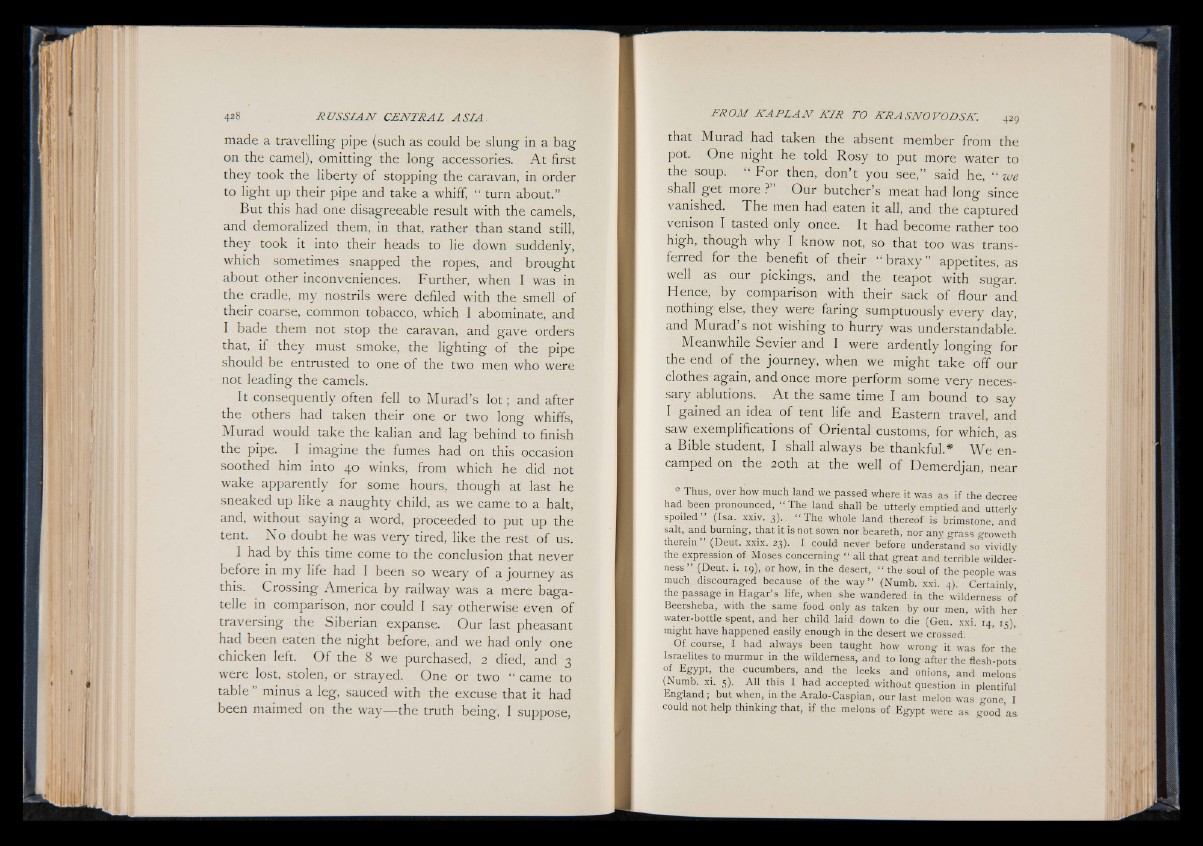
made a travelling pipe (such as could be slung in a bag
on the camel), omitting the long accessories. A t first
they took the liberty of stopping the caravan, in order
to light up their pipe and take a whiff, “ turn about.”
But this had one disagreeable result with the camels,
and demoralized them, in that, rather than stand still,
they took it into their heads to lie down suddenly,
which sometimes snapped the ropes, and brought
about other inconveniences. Further, when I was in
the cradle, my nostrils were defiled with the smell of
their coarse, common tobacco, which I abominate, and
I bade them not stop the caravan, and gave orders
that, if they must smoke, the lighting of the pipe
should be entrusted to one o f the two men who were
not leading the camels.
It consequently often fell to Murad’s lot ; and after
the others had taken their one or two long whiffs,
Murad would take the kalian and lag behind to finish
the pipe. I imagine the fumes had on this occasion
soothed him into 40 winks, from which he did not
wake apparently for some hours, though at last he
sneaked up like a naughty child, as we came to a halt,
and, without saying a word, proceeded to put up the
tent. No doubt he was very tired, like the rest of us.
I had by this time come to the conclusion that never
before in my life had I been so weary of a journey as
this. Crossing America by railway was a mere bagatelle
in comparison, nor could I say otherwise even of
traversing the Siberian expanse. Our last pheasant
had been eaten the night beforehand we had only one
chicken left. O f the 8 we purchased, 2 died, and 3
were lost, stolen, or strayed. One or two “ came to
table ” minus a leg, sauced with the excuse that it had
been maimed on the way— the truth being, I suppose,
that Murad had taken the absent member from the
pot. One night he told Rosy to put more water to
the soup. “ For then, don’ t you see,” said he, “ we
shall get more ?” Our butcher’s meat had long since
vanished. The men had eaten it all, and the captured
venison I tasted only once. It had become rather too
high, though why I know not, so that too was transferred
for the benefit of their “ b ra x y ” appetites, as
well as our pickings, and the teapot with sugar.
Hence, by comparison with their sack of flour and
nothing else, they were faring sumptuously every day,
and Murad’ s not wishing to hurry was understandable.
Meanwhile Sevier and I were ardently longing for
the end of the journey, when we might take off our
clothes again, and once more perform some very necessary
ablutions. A t the same time I am bound to say
I gained an idea of tent life and Eastern travel, and
saw exemplifications of Oriental customs, for which, as
a Bible student, I shall always be thankful.* We encamped
on the 20th at the well o f Demerdjan, near
* Thus, over how much land we passed where it was as if the decree
had been pronounced, ‘ ' The land shall be utterly emptied and utterly
spoiled” (Isa. xxiv. 3)., “ The whole land thereof is brimstone, and
salt, and burning-, that it is not sown nor beareth, nor any grass groweth
therein” (Deut. xxix. 23). I could never before understand so vividly
the expression of Moses concerning “ all that great and terrible wilderness
” (Deut. i. 19), or how, in the desert, “ the soul of the people was
much discouraged because of the way” (Numb. xxi. 4). Certainly,
the passage in Hagar’s life, when she wandered in the wilderness of
Beersheba, with the same food only as taken by our men, with her
water-bottle spent, and her child laid down to die (Gen. xxi. 14, 15),
might have happened easily enough in the desert we crossed.
Of course, I had always been taught how wrong it was for the
Israelites to murmur in the wilderness, and to long after the flesh-pots
of Egypt, the cucumbers, and the leeks and onions, and melons
(Numb. xi. s). All this I had accepted without question in plentiful
England; but when, in the Aralo-Caspian, our last melon was gone I
could not help thinking that, if the melons of Egypt were as good ’as